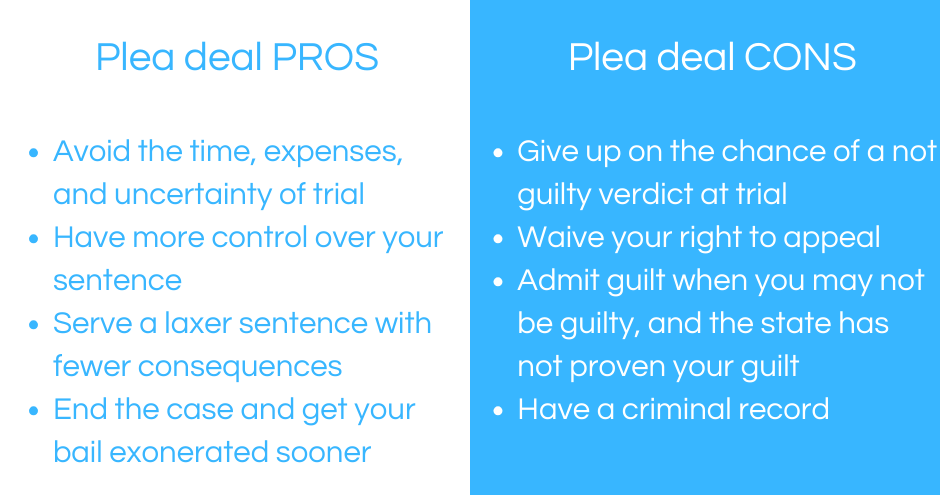
The plea bargain process is a negotiation between the prosecutor, on one side, and you and me as your criminal defense lawyer, on the other.
The goal is to come to a mutually-agreeable resolution without taking the case to a trial the outcome of which is uncertain to both sides. Most criminal cases are resolved through a plea deal.
What is the plea bargain process?
The plea bargain process is a negotiation between the prosecution and us (the defense). The prosecutor tries to secure a criminal conviction that carries the harshest punishment possible without a trial. Meanwhile, I try to secure the outcome most favorable to you. The criminal trial serves as a deadline for the negotiation.
Just like with any negotiation, the plea bargain process is a series of offers and counteroffers. How much ground each side is willing to give up will be driven by the strength of the prosecutor’s case against you.
- If the district attorney has a very strong case, they are unlikely to concede very much.
- If the prosecutor has a weak case, then I will have lots of leverage to use to secure a favorable plea deal.
These negotiations can be formal or informal. They may happen
- in the district attorney’s office or in a room
- in the courtroom.
They may happen
- over the phone or even
- by email.
They can last a long time or be settled very quickly. Some plea bargain negotiations take until the eve of the jury trial. Others begin and end in under an hour, sometimes without a single court appearance.
If you are unrepresented, you are unlikely to get a plea offer that varies much from the original charge. Hiring a lawyer from a reputable law firm is critical, especially if you are facing serious charges or have been accused of a sex crime.
If both sides come to an agreement, it will create a plea deal. This is a binding agreement. You agree to plead guilty in exchange for concessions from law enforcement. Those concessions can include:
- dropping other criminal charges,
- reducing the severity of the charge,
- pursuing a lighter sentence,
- changing the punishments to be imposed, or
- letting you pursue a pretrial diversion program.
The case will then skip forward several steps in the criminal justice system.
- The trial will get canceled.
- Any other pretrial hearings will also be canceled.
- The case will go straight to a sentencing hearing.
At the sentencing hearing, the judge will make sure that you understand your constitutional rights and the implications of the plea agreement. If the judge is satisfied that you are entering the agreement knowingly and voluntarily, they will usually approve the deal. The terms of the agreement will then be imposed, and you will serve the sentence.

What are some common plea deals?
Generally, there are 4 different types of plea bargains:
- count bargaining,
- sentence bargaining,
- charge bargaining, and
- fact bargaining.
However, you may choose to plead “straight up” to the charges that have been filed.
I will know which type or types to pursue based on your case and your interests.
Count bargaining
You can engage in count bargaining if you are facing multiple criminal counts or charges. Count bargaining involves offering to plead guilty to one or more of the counts in order to have others dropped.
For example: Claire is being charged with one count of trespassing and one count of loitering. She offers to plead guilty to the trespassing charge if the loitering offense gets dropped.
Sentence bargaining
Sentence bargaining focuses the plea negotiations on the terms of the sentence. You can offer to plead guilty to the charges that have been filed, if the prosecutor urges the court to impose a specific set of sanctions or a reduced sentence. This is common in cases where you want to avoid jail time and are willing to accept other penalties in high amounts, like fines or community service, in order to do so. It is also common for low-level offenses and misdemeanors that are eligible for diversion.
For example: Mike is charged with a first offense of driving under the influence (DUI). He offers to plead guilty in exchange for being sentenced to a diversion program.
Charge bargaining
You can also bargain over the charges being filed. You generally do this by offering to plead guilty to a lesser charge. This is especially common when the offense is a low-level felony or a wobbler. Felony convictions carry lots of collateral consequences that are not present for a misdemeanor offense. By agreeing to plead guilty to a misdemeanor, you can avoid the potential for those repercussions that come with having a felony on your criminal record.
For example: Dale is charged with a domestic violence offense of aggravated felony trespassing. This is a wobbler. He offers to plead guilty, so long as the charge is dropped to the lesser offense of aggravated trespassing, which is a misdemeanor.
Fact bargaining
In fact bargaining, you generally plead no contest, or nolo contendere, in order to prevent the facts of the case from being investigated and released. No contest pleas have the same effect as a guilty plea. You are simply saying that you will not fight against the charge, but without admitting guilt. The sentence to be imposed will remain the same – prosecutors will generally not reduce it during fact bargaining.
Fact bargaining is often done when you want to preserve your reputation or to prepare for a civil case for compensation.
In some jurisdictions, the criminal law does not allow for no contest pleas.1 In others, like California, it is an admission of guilt if made to a felony charge.2
For example: Brittany is charged with DUI causing injury after causing a car accident that seriously injured Tim. Brittany knows that the DUI investigation is going to uncover damning evidence against her. She also knows that Tim will likely file a personal injury claim against her for causing his injuries. Brittany decides to engage in fact bargaining and plead no contest in order to avoid an admission of guilt.
When do these negotiations take place?
Plea bargaining can begin as early as the arraignment. Deals can be struck at any point up to the jury’s verdict. Many plea deals are made during the preliminary hearing. By the time this hearing comes up, both the prosecutor and we have had time to investigate and will have a solid understanding of the case.
Courts and judges encourage plea deal negotiations, often aggressively. Trials are time-consuming, and courts are backlogged. Resolving as many criminal cases as possible through the plea deal process is essential to the criminal court system.
Can a plea deal be taken back?
Once you enter a plea of guilty or no contest, it is very difficult to convince the court to allow you to withdraw the plea. Regretting the terms of the deal does not suffice. You generally have to show that you did not enter the deal knowingly or voluntarily in order to get it rescinded.
Should I plead guilty (or no contest) if I am innocent?
This is a personal decision to make. I do not like anyone to accept a conviction when they are innocent, and I would prefer to take the matter to trial and argue in front of a jury.
However, some defendants are understandably scared of the uncertainty of a trial. They would rather accept a plea with a pre-determined sentence they can live with rather than risk a harsher sentence at trial, especially if the charge carries a mandatory minimum jail/prison sentence.
Some plea deals are very good and may be worth considering, especially if the plea deal:
- does not require you to go to jail/prison,
- does not strip you of gun rights,
- does not trigger a driver’s license suspension, and
- imposes manageable fines and court costs.
Any plea deal that reduces a felony charge to a misdemeanor is always a win because misdemeanors have less of an adverse effect on your employment, educational, professional licensing, and housing prospects. Misdemeanors do not count as “strikes” in states with “three strike laws.” Also, misdemeanors are less of a barrier than felonies to getting a security clearance.
If I am a first-time offender, can the case be dismissed?
For low-level offenses like drug possession, trespass or shoplifting, many courts are agreeable to dismissing your charge once you complete a diversion program. Courts figure if you are a first-time offender, it makes more sense to rehabilitate you than to punish you.
Depending on the charge, diversion typically consists of rehab and/or an educational course. You may also have to pay fines, do community service, and submit to drug tests.
Though if you fail to complete diversion, then you will be prosecuted for the underlying offense. Plus chances are any plea deal the prosecutor offers you will require a conviction.
Additional resources
For more in-depth information about plea bargains, refer to these scholarly articles:
- The Prisoners’ (Plea Bargain) Dilemma – Journal of Legal Analysis.
- Fairness and the Willingness to Accept Plea Bargain Offers – Journal of Empirical Legal Studies.
- The Plea-Bargain Crisis for Noncitizens in Misdemeanor Court – Immigration and Nationality Law Review.
- Felony Plea Bargaining in Six Colorado Judicial Districts: A Limited Inquiry into the Nature of the Process – Denver University Law Review.
- Colorado Counsel Conundrum: Plea Bargaining, Misdemeanors, and the Right to Counsel – Denver University Law Review.
Legal References:
- See for example New York Criminal Procedure Law 220.10.
- California Penal Code 1449 PC.

